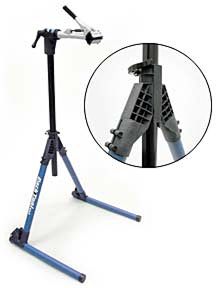Search Case Studies
End-Use Case Study
- Long fiber nylon 6/6 survives 5 times more load than short glass fiber nylon
- Improved rigidity and impact strength
- Black color yielded aesthetic surface finish

Park Tool’s PRS5 model professional racing stand is designed for portability; aluminum and reinforced plastics keep the stand’s weight low and its strength high. Mechanics can fold up the lightweight stand and take it to the track or into the field, providing solid, hands-free maintenance capabilities—nearly as convenient as being in the shop.
At the heart of the stand is a thermoplastic composite yoke that accepts the weight of the bicycle and evenly distributes that load to the stand’s rotating legs. The yoke is subjected to extreme pressures in tension and compression. Additionally, it is the brunt of high-impact loads resulting from maintenance work being performed on the bike it holds.
Originally molded with a conventional, short glass fiber reinforced nylon, the product worked well and was lauded for its utility; however, some breakage did occur. Although the number of failures was small—less than 1%—Park Tool was concerned. Rather than increase the stand’s strength and weight by using more aluminum or steel, engineer Pierre Oster worked with RTP Company engineers to mold the stands joints from a nylon 6/6-based RTP 200 Series long glass fiber reinforced compound.
Long fiber materials exhibit some unique mechanical properties. First, higher loadings of glass fiber are possible, imparting greater strength and rigidity into the material. Typically, a designer must compromise impact resistance for this rigidity; as stiffness is increased, materials usually become more brittle. Long glass fibers within compounds absorb this load and distribute it more evenly throughout the matrix resin. The result is higher impact strength than can be achieved with short glass fiber compounds. The nylon 6/6 long glass fiber compound used for Park Tool’s stand has a notched Izod impact strength of 8.0 ft lbs/in (472 J/m), nearly four times that of a comparable short glass-filled nylon.
To simulate field use, Park Tool developed a test incorporating a 50-pound (22.7 kg) load that was repeatedly dropped on the yoke. Oster reported that the long fiber compound “sustained more than five times the load of the previous material in our testing.” Additionally, he noted, “There is less deflection occurring with the long fiber compound. Twisting is reduced, but, even with the increased stiffness, we see no breakage from impact.”
The yoke is approximately 8 in. (203 mm) long with wall thickness tapering to 1/4 in. (6.4 mm). Addressing concerns that a long fiber material would not fill the mold properly, RTP Company engineers added a lubrication package. Eric Hawkins, Vice President of Park Tool, stated, “Even with the high fiber content, the material flowed and packed very well. The black coloring yielded a smooth surface and a very nice, cosmetically appealing part.” He went on to say that RTP Company’s “quickness and competence has helped us maintain our standing as the premier manufacturer of cycling tools.”
Park Tool USA manufactures quality bicycle repair and maintenance tools from their headquarters in St. Paul, MN. For more information visit their website at www.parktool.com.




